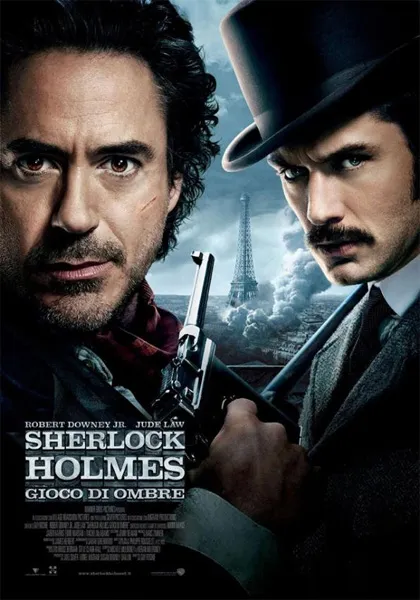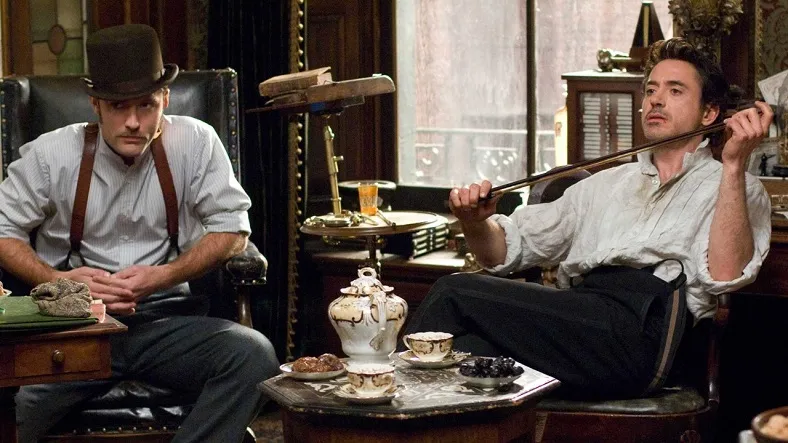If you have watched Guy Ritchie's films, then you have an idea that all of them share many common features that sometimes make people say they just copy themselves, making only slight, cosmetic changes. But what does that mean and is 100% true is not the topic of our conversation. The point is that, given these characteristics and the fact that Sherlock Holmes was a big hit, it is hardly surprising for anyone that the sequel "A Game of Shadows" is a variation of the same theme modeled in the typical for most of the sequels proportions - bigger, louder, more action-packed and more hilarious. Or in other words, "from the same thing", but two. But what does it do, better or worse than the first one? When I first watched "Sherlock Holmes," I was rather disappointed, although the overall visual style, along with the ideological jumps back and forth in time (in the analysis of the battle scenes), as well as the performances and chemistry between Downey, Lowe and McAdams, I definitely liked it. On the second and third watch, however, by saying "it grows on me" and I started to appreciate it for what it is. The only remark that struck me was that at the end of the film the mysterious stranger who manipulated the heroine of Rachel McAdams, was named by name, and was not left with only the initials "M" and the information that he was a professor. It somehow spoils the part of the mystery.

In fact, the mystery is connected with the biggest drawback of "A Game of Shadows". Right from the start, Professor James Moriarty is portrayed as the main villain in the film (Holmes's equal intellect, unscrupulous criminal with a global scale, whose network is of such magnitude that it is difficult to understand how the individual elements fit it) and pure is brought to light, which slightly neglects the idea of the elusive shadow adversary. In principle, this would not be a problem if, as with the first movie (which also knew who the villain was from the beginning), we had the moment "how did it" and "why" or something as interesting as opposing the medieval fears of supernatural and magic and scientific methodology, but unfortunately, they are missing. Of course, there is an element of what Moriarty's final point is and how the individual "incidents" are tied, but it is definitely in the background. Here the main point is which of the two geniuses will prevail in the deadly chess game (literal and metaphorical) in which they have embarked. But even if you have not read "Ultimate Case", which is part of history and you do not know the outcome of the final conflict between Holmes and Moriarty, you will hardly know how it will do everything (with the ever- gates "for new adventures), and this is disappointing.
In general, this is the end of my more serious criticism of the film, though it is not the only thing I can point to as a flaw. Moriarty's overall plan is too much James Bondowski (something we unfortunately found in "Mission Impossible: Phantom Mode"), the heroine of Nuvi Rapas is undeveloped, and from a certain point of view and unnecessary (and we can not even accept it with the usual an excuse to at least beautify the landscape), some of the jokes are overwhelmed, and last but not least, there are no directing surprises from Richie in the film - we have two interesting and entertaining developments in the cadence design of a forthcoming battle, but I would not say that they are the merit of the director. All this, however, will be not good for fans of the first film, who are not in the mood for anything but a two-hour action-packed fun with their favorite heroes, that's what they get. Robert Downey Jr.(who finds an exceptionally pleasant approach to Sherlock's image, which seems strangely believable, still far from the origin and the crafty features it imparts to him) and of course Jude Law as Watson. The chemistry between the two is indisputable and engaging, and at least I would have looked at them together at least a few more times.

There is no way to talk about actors and not to say anything about the others. First, I'm glad that Rachel McAdams still has a role in the movie, however small (at least not "blink and miss it" like Eddie Marson's) because besides being nice and can play, the heroine's relationship with Holmes is one of my favorite things in both films. Second, Jared Harris is unique. His Moriarty is taken up and quite ordinary, which gives him an incomparable threat that perfectly fits with the image. I think he nailed him, but I did not expect anything less than Richard Harris's son, yet the blood was not running.